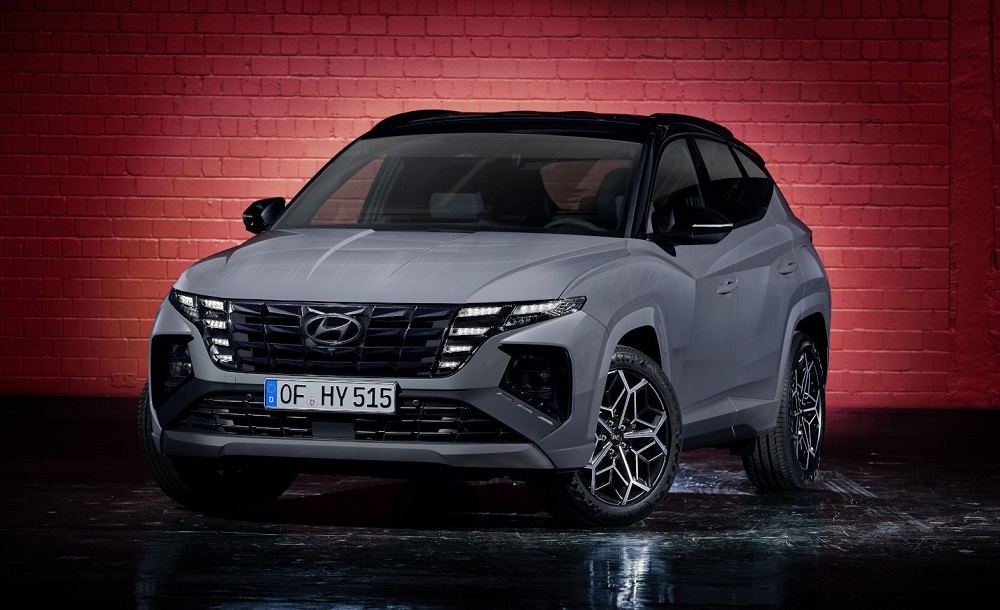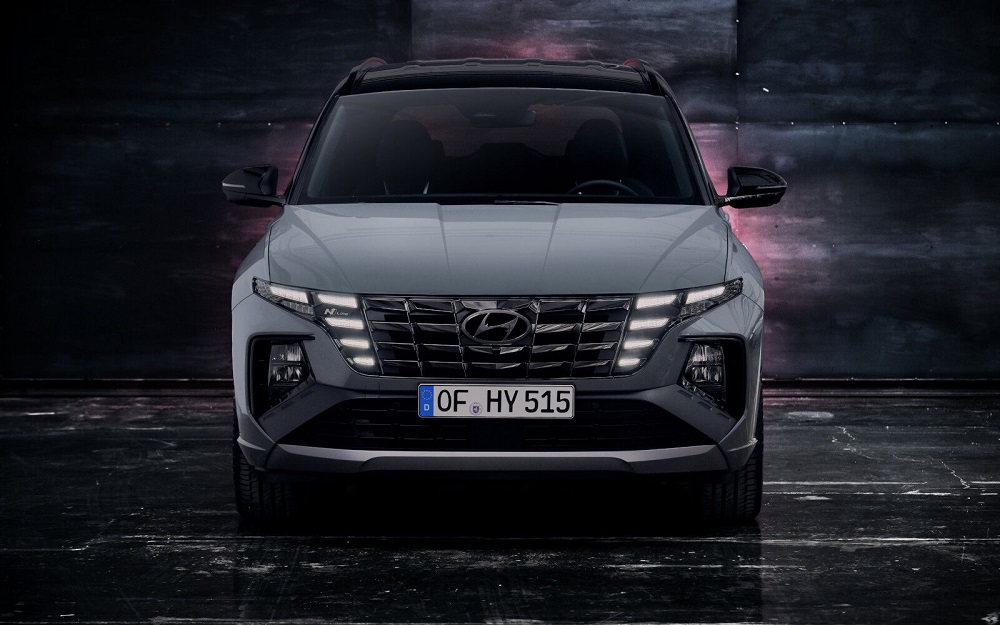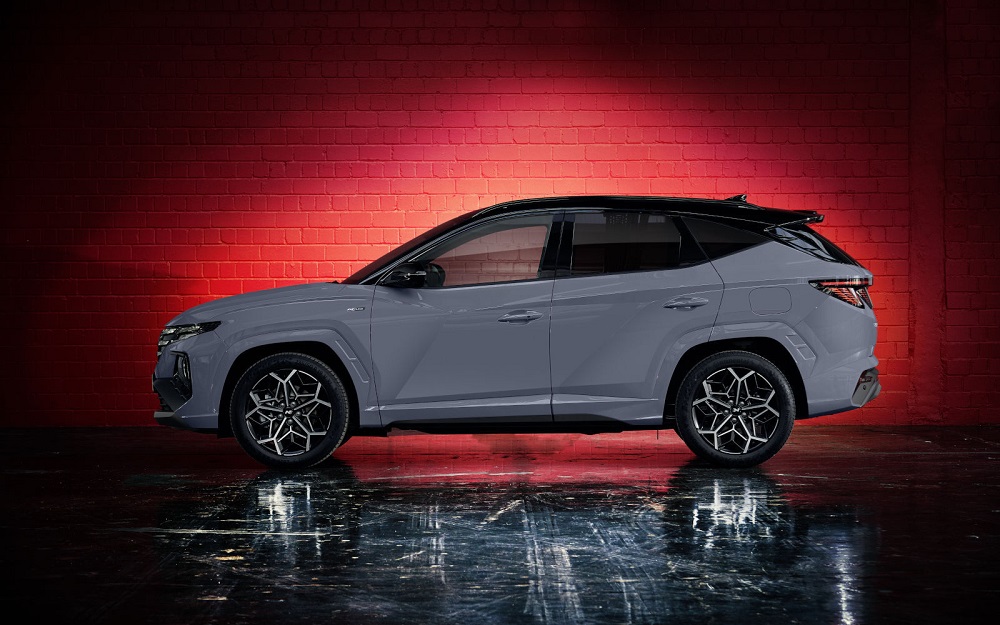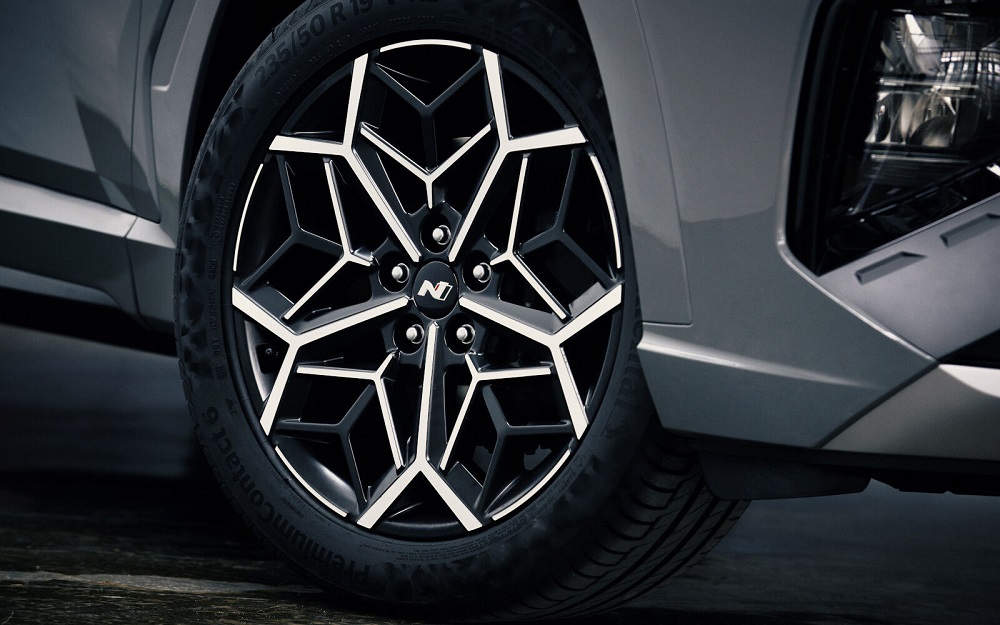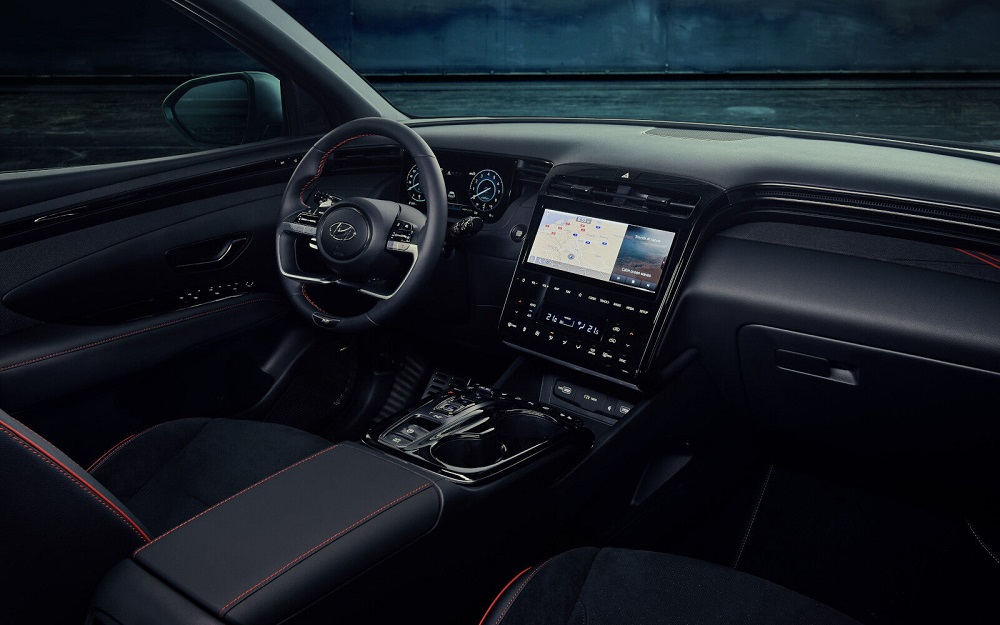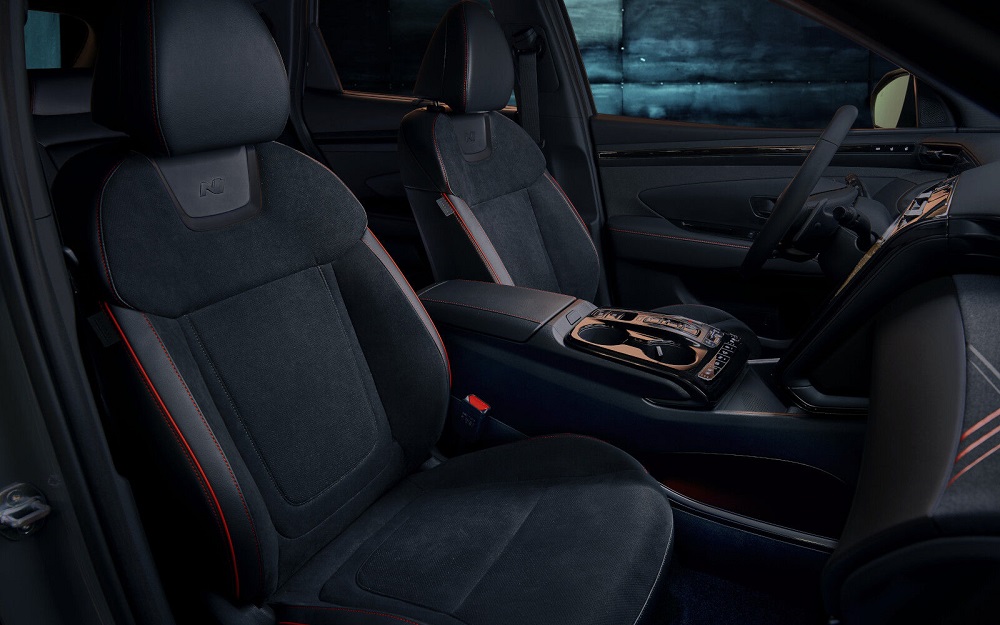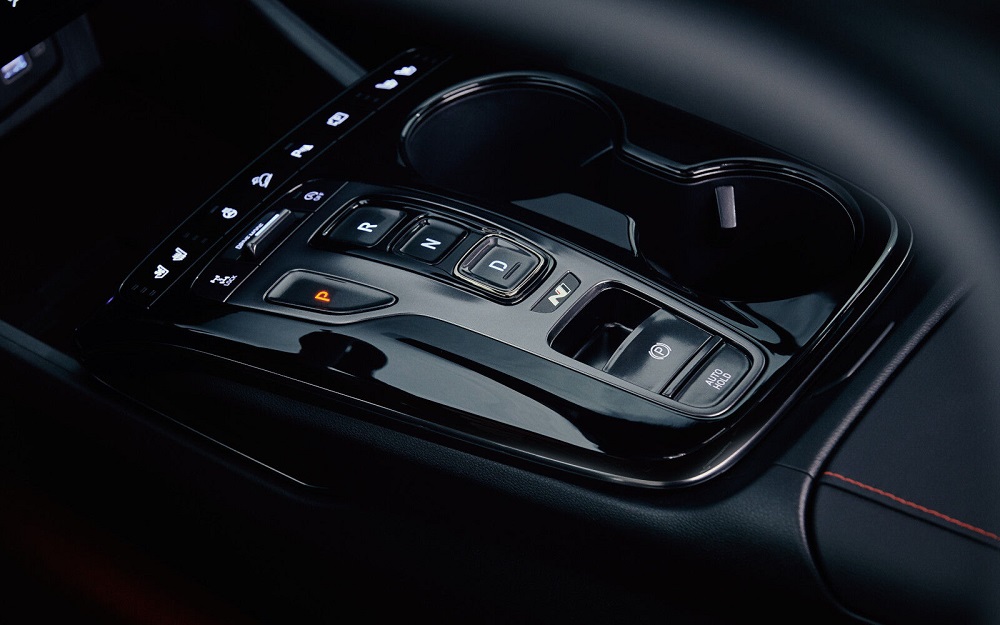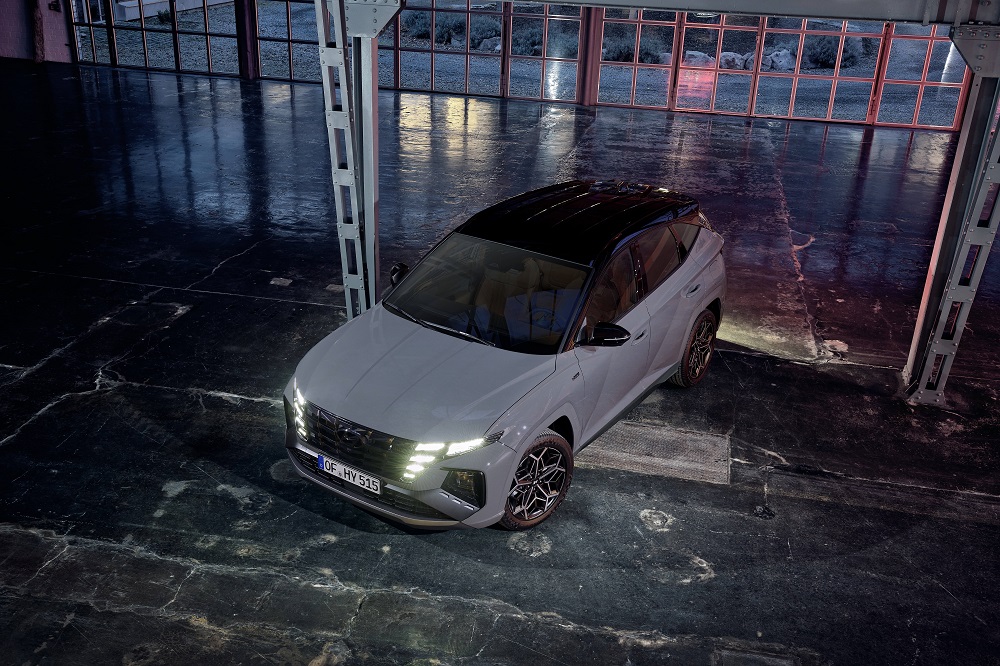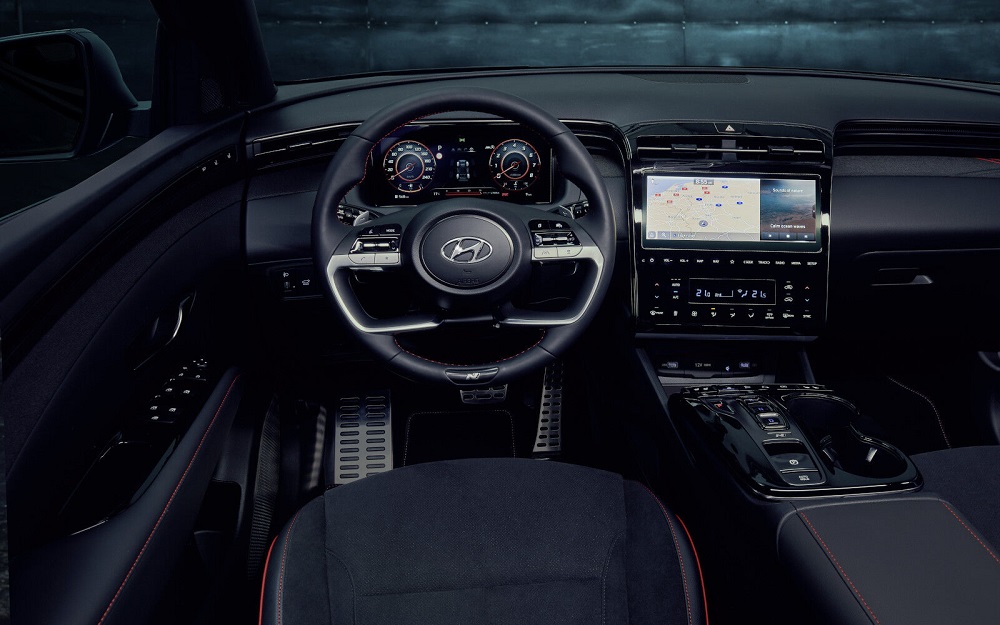The Tucson N Line combines the ultimate dynamic design, comfort and advanced connectivity of the Tucson with the motorsport-inspired styling and attitude of N Line.
It offers sporty and distinctive exterior design features and differentiating interior details so customers can enjoy a driving experience with even more attitude.
Like the standard model, the Tucson N Line stands out for its progressive design, integrating sharp lines, angles and shapes, as well as the Tucson’s new signature parametric jewel patterns.
At the front, parametric jewels are displayed elaborately on the grille, which sits taller and is wider than on the all-new Tucson. For the N Line version, the parametric jewel patterns on the grille pieces have been elaborated with edges, creating additional reflections depending on the angle. The grille also incorporates the N Line badge. Under the grille sits a rectangular-shaped bumper and a refined air intake, which is taller and bigger than on the standard Tucson for a sportier look. The bumper, which is replicated at the rear, works harmoniously with the bright silver skid plates. Meanwhile, striking black bezels frame the head lamps.
At
the side, the all-new Tucson N Line is characterised by an
energetic-looking side moulding in body colour which offers dynamic
proportions and lines to provide a slimmer look. This is complemented by
a vibrant daylight opening (DLO) in glossy Black. The DLO terminates in
the fast angle of the C-pillar, which generates a race track-inspired
feeling of forward motion. Stylish Phantom Black side mirrors further
enhance the Tucson N Line’s sleek styling.
The Tucson N Line is equipped
with stronger and sportier 19-inch alloy wheels. Continuing the Sensuous
Sportiness theme, parametric patterns emphasise their geometric
structure. These are supplemented by wheel arches which match the body
colour of the car.
Customers can choose from seven exterior
colours. For even more personalisation, customers can select an optional
two-tone roof in Phantom Black with five colour trims: Shadow Grey
[exclusively for N Line] with optional Phantom Black roof, Polar White
with optional Phantom Black roof, Engine Red with optional Phantom Black
roof, Sunset Red with optional Phantom Black roof, Dark Knight with
optional Phantom Black roof, Shimmering Silver and Phantom Black.
The Tucson N Line’s sophisticated and spacious interior features flowing forms inspired by waterfalls. This is accentuated by sporty N Line interior styling and an exclusive colour pack.
Customers can enjoy N-branded sporty seats with black suede and leather seat coverings, as well as red stitching. Red stitching is also woven on the door trim and armrest, while the grey cloth crash pad is garnished with red accents. A dedicated N steering wheel arrives complete with an N logo. Other N design elements are to be found on the leather gear shift knob or shift by wire console cover, depending on the chosen transmission. Meanwhile, a black headliner gives the interior an extra sporty touch. Further N Line enhancements include metal pedals, a foot rest and door steps.
The ECS automatically and continuously controls the vehicle’s suspension to maximise driving comfort and performance. It achieves this by taking into account driving conditions such as speed, road surfaces, cornering, stopping requirements and acceleration. By controlling the damping force on each individual wheel, ECS reduces roll, pitch and vertical motion to enhance ride and handling. Engineers at Hyundai Motor Europe Technical Center (HMETC) created separate optimised ECS parameter settings with specific tuning for versions of the Tucson N Line that are equipped with 48-volt powertrains. This provides even more driving fun for N Line customers, matching the model’s sporty look.
Hyundai’s engineers optimised the ECS for variants of the all-new Tucson N Line to achieve a better damping of vibrations and more agility. On the Tucson N Line, the ECS logic reacts faster and more strongly to both body movements and steering commands. In Normal mode, the engineers maintained the good driving comfort in city traffic, ensuring it only becomes significantly tighter at typical country road speeds. Meanwhile, Sport mode has been sharpened and offers more control and feedback over the entire speed range. Here, more initial connection and anti-roll support ensure even greater control on the road.
As a consequence of the adjusted ECS logic, the steering also feels different on these variants. It is more centred, while feeling better connected and slightly heavier.
As with the standard version, the Tucson N Line is available with a variety of powertrains for both power and efficiency, which are available with different levels of electrification or without. The N Line trim will be available with all variants of the all-new Tucson except the low power diesel version.
Each powertrain is based on one of two Hyundai Smartstream engines for maximum efficiency: a four-cylinder 1.6-litre T-GDI gasoline or a four-cylinder 1.6-litre CRDi diesel engine.
As with the all-new Tucson, a host of human-oriented technology features enable an intuitive user experience, including a fully digital configurable dual cockpit which consists of a new 10.25-inch open cluster without a housing and 10.25-inch AVN touchscreen with Hyundai Bluelink connected car services. This offers a personalised space that is intuitively optimised for a high-tech user experience.
The Tucson N Line also features Multi-Air Mode technology. This consists of a combination of direct and indirect air vents for air conditioning and heating to create a more pleasant indoor environment with more gentle air flow. The three-zone climate control caters to passengers in the rear seats in addition to occupants in the front of the vehicle. In addition, ventilated seats in the front and heated seats in the front and rear provide further comfort for the driver and passenger alike.
In addition, the Tucson N Line’s best-in-class driver-assistance and active safety package make it one of the safest vehicles on the market. Blind-spot View Monitor (BVM) offers an enhancement of the views on the side mirror by showing the rear view in the cluster when the turn signal is activated. Meanwhile, Highway Driving Assist (HDA) keeps the car in the centre of its lane while adapting the speed based on navigation data and traffic around, for example for upcoming curves on highways. Among others, Remote Smart Parking Assist (RSPA), which is available on the hybrid and plug-in hybrid models, allows the car to park itself, taking the pressure off the driver in tricky parking situations. A variety of other safety features contribute to improving visibility, protecting both front and back-seat occupants, and preventing collisions.
The all-new Tucson N Line will be available in Europe starting in spring 2021. The hybrid and plug-in hybrid variants will be available from summer 2021.

